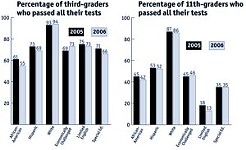Don't Ask, Don't Tell, Don't Know at the SBOE
The State Board of Education considers health textbooks, and abstains
By Rachel Proctor May, Fri., July 23, 2004
The SBOE, at least officially, does not change content of textbooks: The Legislature put an end to that in 1995 when it became clear that the conservative-dominated board was putting way more than its two cents into the texts. By law, the board can only determine if the books meet the state-mandated curriculum and contain no "factual errors." However, the board still approves the books, and the proposed health texts make it clear that the publishers fully understand which side of the political spectrum butters their bread. Only one of the four books uses the word "condom," and then only in a brief reference. The others refer only to an undefined "barrier method," and then only to point out that this method is not 100% effective.
That is not an absolutely untrue statement – but standing alone it is more misleading than helpful to a teenager hoping to learn about contraception. The majority of the 109 speakers who signed up to testify argued that condoms are still highly effective in preventing pregnancy and STDs – and that Texas high school students, half of whom are sexually active, need to know that.
"I am ashamed of what is not in those books," said Bernard Kaye, a Frisco attorney and school volunteer who served on one of the textbook review panels.
Like most who opposed the textbooks (and that meant most of the speakers – only 15 people signed up to speak in favor), Kaye argued that the books do not conform to the state-defined Texas Essential Knowledge and Skills requirements and thus cannot legally be approved. According to the TEKS, a health textbook must "analyze the effectiveness and ineffectiveness of barrier protection and other contraceptive methods." None of the textbooks do this; at best, the teachers' guides (whose content counts toward meeting TEKS) include the suggestion that students conduct this kind of "analysis" as a classroom activity – though they don't provide enough information in the main text so that students could actually do so.
"How in the world can you analyze the effectiveness of something if it's only mentioned?" asked Kaye.
Publishers argue that plenty of information is to be found in supplements that accompany the main texts. Rick Blake, a spokesman for Holt, described their 128-page supplement as "detailed" and "explicit," and said that it allowed the book to be used in school districts with varying political climates. "The reason for including the more explicit sexual content in a separate volume is that it gives local school districts more flexibility in when and how they want to treat this material," Blake said.
He pointed out that Holt's Lifetime Health, which included the most-mocked line of the four offerings (the inclusion of "get plenty of rest" in a list of ways to prevent STDs) was already approved without controversy in Arkansas and North Carolina, and is being sold in many other states without centralized textbook adoption processes, such as Illinois and New York.
But clearly there are some in Texas who would prefer teens don't see the material at all. Terri Leo, who represents the northwest Houston suburbs, was one of several board members who repeatedly argued that Texas needed to do more to champion abstinence. "Maybe the reason Texas has such high numbers is that abstinence has never been taught," she said. "I believe that with the adoption of these books the numbers will go down."
Leo also made the classic conservative argument that if it's good enough for East Africa, it's good enough for the Lone Star State, and (incorrectly) cited an abstinence-only sex ed program in Uganda as the reason that country is the only one in Africa to reduce its HIV/AIDS infection rate. (The successful Uganda program is actually called "ABC" for "Abstinence, Being faithful, and Condoms" – a good two steps more than Texas teens would get in their proposed health education.)
It is this question – where abstinence-"based" ends and abstinence-"only" begins – that rankles opponents of the textbooks. "Abstinence-based education that is complete, factual, medically accurate, and includes contraceptives is what we all want, but abstinence-only leaves out half that information," said Janet Alyn, who argued against adopting the textbooks.
Several board members agreed.
"I want you to think about our children, and not just your political future," said Alma Allen, who represents Houston. "We are killing our kids. We might as well take a gun and blow them all down." Similarly, Mavis Knight of Dallas sparred with Beaumont's David Bradley when the latter shared an anecdote about his plumber's two children being the result of condom failure.
"I don't know one thing in this world that's fail-safe," she said.
"Abstinence," Bradley shot back.
"Oh, abstinence can fail," said Knight. "If you fail to practice your abstinence."
For those who missed the midsummer spectacle, a second hearing is scheduled for Sept. 8. Members of the public can sign up to testify by contacting the SBOE by phone at 463-9007 or fax at 936-4319 before Sept. 4. (For more info, go to www.tea.state.tx.us/sboe/input/hearing.html.)
Got something to say on the subject? Send a letter to the editor.










